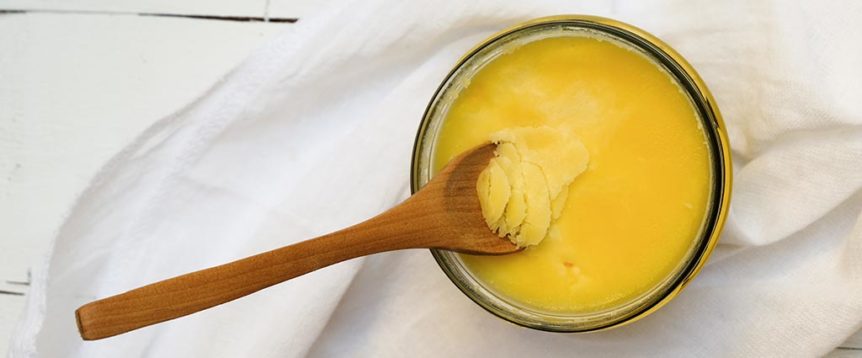Ghee is trendy—in America. But in India, and other cultures throughout Asia and Africa, it’s been a cuisine staple for millennia. Here’s the lowdown on this versatile form of butter.
The Basics
Ghee is a type of clarified butter, or unsalted butter that is melted slowly until the liquid and solid parts separate. Any impurities are skimmed from the top, and the milk solids that sink to the bottom are removed, leaving the liquid fat. Ghee differs from other clarified butters in that it’s heated for longer, which gives it a richer, nuttier flavor.
Try: Simple Truth® Organic Ghee Clarified Butter with Pink Himalayan Salt
Organically Grown, No Preservatives, Grass-Fed, High Smoke Point, USDA Organic, Non-GMO, Lactose-Free, Gluten-Free. Ghee Whiz!
Ghee vs. Butter: Key Differences
After liquid ghee solidifies, it is shelf-stable without refrigeration—picture the consistency of coconut oil.
The clarifying process removes most of the casein, whey, lactose and more, making it likely more digestible for people who have problems with milk (although the quantities of those substances in regular butter are so small that many can tolerate it just fine).
Ghee has a higher smoke point (485 degrees vs. 350 degrees for butter), because the milk solids have been removed. See “How to Use It” below.
Nutrition Notes
Ghee is at least 80 percent fat, but, many experts argue, it is a “good” fat. Like all butter (especially grass-fed varieties), it contains conjugated linoleic acid (CLA), a fatty acid that might protect against cancer. Ghee is essentially a concentrated form of butter, which means it has more calories, fat and vitamin A than an equivalent amount of butter. Concerns have arisen that ghee might contribute to heart disease, but several animal studies have suggested otherwise. When consumed in moderation, ghee can likely be part of a heart-healthy diet.
How to Use It
Versatility may be ghee’s strongest selling point. Its high smoke point makes it a great choice for sautéing, frying, roasting and other high-heat cooking methods. Ghee can also be swapped for butter or shortening in pie crusts, cookies and other baked goods, but you might need to play around with the recipe to find what ratio works best.
On Trend: Stir 1 teaspoon of ghee into your coffee for some added healthy fat.



